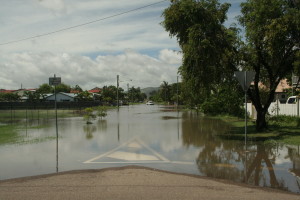Emotions shouldn’t drive Ohio legislation

By Maggie Thurber | for Ohio Watchdog
FLOOD RESCUE: An Ohio bill outlawing driving into a flooded area has a twist: a monetary sanction that would go to the rescuer of trapped motorists.
On June 22, 2006, Allen Anderson Jr., a veteran swift water rescue technician with the Wellington Fire District, attempted to rescue two kids clinging to a tree in “violent, rushing, swift water” that had flowed over a road from a tributary of the Black River.
During his second attempt, Anderson indicated he was in distress and firefighters assisted him to shore. He was unresponsive and later declared dead. The teens were rescued by others.
The life of rescue personnel is always one of risk, but does such a tragedy, too often repeated, require a new law?
Apparently so, according to proponent testimony this week in the Ohio House.
Senate Bill 106 would prohibit the operation of a motor vehicle on any location that is temporarily covered by a rise in water level. It would also impose a sanction of up to $2,000 for the cost of the rescue of any person who violates the law — and that sanction would be paid to the person’s rescuer.
Wellington Fire Chief Glenn Wetherbee testified at the hearing.
“If passed, Senate Bill 106 will act as a determent for motorists choosing to ignore road closed signage,” he said. “Choosing to ignore high water and road closure signs should also be viewed as willful or wanton disregard for the safety of persons or property.”
“If passed, Senate Bill 106 will help comfort the family of our fallen Firefighter Allan ‘Buz’ Anderson Jr. and ensure them that the efforts and sacrifice he made for his community was not done so in vain,” Wetherbee added.
It’s a nice gesture, but can $2,000 really comfort a family who has lost a loved one? Will money really tell a community that a firefighter’s efforts and sacrifice were not in vain?
Common sense should tell a motorist that driving on a flooded road is a really bad idea.
True, common sense seems to be lacking these days, but does anyone think a motorist will venture onto a flooded road expecting to be carried away? Usually, it’s because they didn’t see the danger, or thought the water wasn’t as high as it turned out to be.
So maybe a law prohibiting someone from driving through high water or imposing a fine for ignoring road closure signs is needed.
But should a rescuer be reimbursed for the cost of the rescue?
The definition of a rescuer includes “a state agency, political subdivision, firefighting agency, private fire company, or emergency medical service organization,” so it’s not like the money is going to a single person.
These entities already receive funding for doing their job; that’s what tax dollars pay for.
If a rescuer is to be paid for a flooded-street rescue, what about someone who is rescued from a fire? Or a car accident? Or from jumping off a bridge? What about acts of stupidity?
Where does it stop? Should every emergency response result in a fee for the service to the individuals receiving assistance?
At what point does a rescue become a personal thing as opposed to a benefit your tax dollars cover because it is a service needed in a community?
And what about civil suits? Does the creation of a statutory monetary sanction mean the family of a rescuer cannot sue an individual who needed to be rescued, especially when the need for rescue was based upon an action that probably never should have occurred?
These are the questions that should have been asked at the hearing, but weren’t. What politician is going to risk sounding so heartless as to use logic and reason when a fire chief is testifying about the death of one of his own?
The bill will probably pass. The Senate approved it unanimously.
And that’s too bad. Legislation should be based upon logic and reason actual need — not emotions.
The post Emotions shouldn’t drive Ohio legislation appeared first on Watchdog.org.







